Owning a home is a major “end goal” for a lot of people, but once you have that home, that doesn’t mean you can rest easy! In addition to handling that mortgage, there are things within the house that might need future attention and fixes.
I may be anything from broken windows thanks to a stray baseball, to plumbing that starts breaking down in your house. Replacing a window is straightforward, if expensive.
Fixing pipes might be expensive and complex. It all depends on the type of plumbing emergency you have on your hands. Here are the more common ones that might affect a typical household.
Fixtures That Leak
 If you have a faucet that leaks, or a showerhead that drips, this is a pretty “low grade” emergency. But just because it’s not damaging your home, doesn’t mean you should ignore it.
If you have a faucet that leaks, or a showerhead that drips, this is a pretty “low grade” emergency. But just because it’s not damaging your home, doesn’t mean you should ignore it.
Not only does the dripping sound get annoying over it time, it costs you money and higher water bills since it counts as “used” water. Fortunately, this is also a fix that you don’t necessarily need a professional to come over to handle.
In the vast majority of cases, a leaky fixture can be attributed to one or another small, easily replaceable, part that has simply worn out. With a wrench and a spare washer or O-ring, you can usually stop a leak fix the problem!
When a Drain Is Blocked
 This is more serious, but in many instances, you had a lot of advance warning. A blocked drain indicates that somewhere in the pipe, there’s been a build-up of matter that now completely prevents water from exiting down the drain.
This is more serious, but in many instances, you had a lot of advance warning. A blocked drain indicates that somewhere in the pipe, there’s been a build-up of matter that now completely prevents water from exiting down the drain.
Most of the time the first indicator will be a drain that works slowly. At that point, if you choose to ignore the early warning, the drain will eventually become completely blocked.
Your best option this stage is a mechanical solution, such as a plunger, or a plumbing snake if the blockage is relatively close. If the block is further down, you might need professional help. Always be careful with using drain cleaners for this issue. Misuse of such corrosive products can damage older pipes, and even warp modern plastic ones.
Overflow From the Toilet
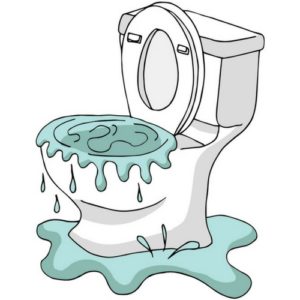 When a blocked drain happens in your toilet, this is not only messy but a potential health hazard.
When a blocked drain happens in your toilet, this is not only messy but a potential health hazard.
Human waste contains contagions that can affect others through exposure or physical contact, so this is not a situation you want to let stand.
Quickly and safely clean up the mess, and use the same mechanical solutions as you would for a blocked drain, or get some professionals to help.
Pipes That Have Burst or Are Broken
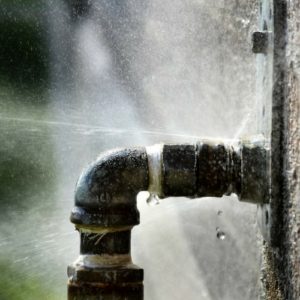 A burst pipe has, unfortunately, the potential to be the most serious and expensive emergency, depending on the pipe and location.
A burst pipe has, unfortunately, the potential to be the most serious and expensive emergency, depending on the pipe and location.
If your water pipes have burst, that means as long as your water supply is on, the burst will leak, which can eventually damage the walls or ceiling where the breakage has occurred.
If the burst is with your drainage/sewer pipe, then this means your used water—including toilet water—can be flooding the home with each use.
If you encounter a plumbing emergency in your Wayne, NJ home, try to assess how serious the situation is. Some issues can be handled by you with a little elbow grease and the right tools. Others, however, should only be tackled by professionals that can do the job safely and permanently.

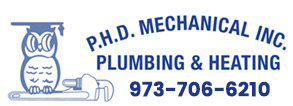


 Rather than wash your vehicle at home, take it to the drive-through car wash. Washing your car with a hose hooked up to a city water supply can get very expensive.
Rather than wash your vehicle at home, take it to the drive-through car wash. Washing your car with a hose hooked up to a city water supply can get very expensive. A plumber can easily hook hoses up to your sink and appliances that direct wastewater from washing, known as greywater, from being flushed down the drain.
A plumber can easily hook hoses up to your sink and appliances that direct wastewater from washing, known as greywater, from being flushed down the drain. If you can’t find the source of a leak in your home, then have a plumber come in and inspect your entire home.
If you can’t find the source of a leak in your home, then have a plumber come in and inspect your entire home. Taking a shower is much less costly than taking a bath, and if you install low-flow showerheads, then you might cut down the water costs of bathing an additional thirty percent.
Taking a shower is much less costly than taking a bath, and if you install low-flow showerheads, then you might cut down the water costs of bathing an additional thirty percent.
 De-icing salt for the driveway, walkways, and
De-icing salt for the driveway, walkways, and 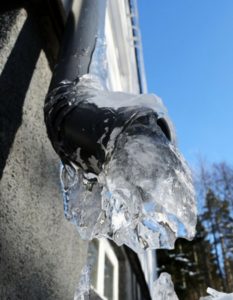 1. Install weather stripping around:
1. Install weather stripping around: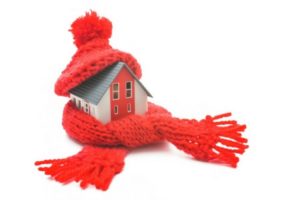 The insulating tasks on the checklist will make your home more efficient, and that means your house will stay warmer and the furnace won’t have to work as hard, and this translates to lower energy bills.
The insulating tasks on the checklist will make your home more efficient, and that means your house will stay warmer and the furnace won’t have to work as hard, and this translates to lower energy bills. If you are not 100% satisfied our services, then take advantage of our 1 year guarantee. We are dedicated to providing the absolute best services. Trust the professionals!
If you are not 100% satisfied our services, then take advantage of our 1 year guarantee. We are dedicated to providing the absolute best services. Trust the professionals!